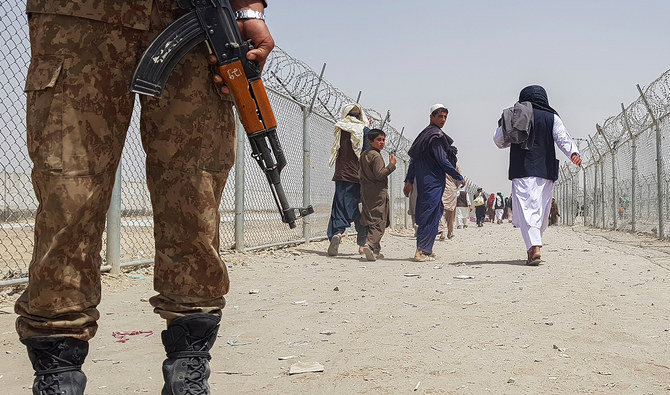ISLAMABAD: The Pakistan army on Monday blamed neighboring Afghanistan for providing “sanctuaries and liberty of action” to militants belonging to the Pakistani Taliban and other groups, which it said was impacting Pakistan’s internal security.
The army’s statement comes after 12 of its soldiers died in two separate attacks last week.
Kabul has denied past accusations that it allows militant groups to launch attacks on Pakistan from its territory.
“The sanctuaries and liberty of action available to the terrorists of proscribed TTP and other groups of that ilk in a neighboring country and availability of latest weapons to the terrorists were noted as major reasons impacting security of Pakistan,” the army said, referring to the Tehreek-e-Taliban Pakistan militant umbrella group.
The Pakistani Taliban, or TTP, is a separate group but allied with the Afghan Taliban. The outfit has intensified its attacks against Pakistani security forces since November last year when it unilaterally called off a fragile truce brokered by the Afghan Taliban. Islamabad says the TTP has been emboldened by the Afghan Taliban takeover of Kabul in August 2021.
Officials in Islamabad have since repeatedly said Kabul was not doing enough to counter the activities of the TTP, many of whose commanders and soldiers fled to neighboring Afghanistan after the Pakistan military launched a series of operations against the group’s stronghold, North Waziristan, starting in 2014.
On Sunday, Pakistan’s Defense Minister Khawaja Asif said his country was “resolute” it would root out “terrorism” from its soil whether or not Afghanistan cooperated with it in, amid a deepening row between the two countries. On Friday, the Pakistan military had also threatened to an “effective response” against Afghanistan two days after 12 of its soldiers died in two attacks.
In an interview to the BBC over the weekend, Taliban spokesman Zabiullah Mujahid’s said the Afghan Taliban had signed the Doha agreement with the United States and were not under any obligation to protect Pakistan’s interests, particularly by taking action against militant groups as desired by Islamabad.
The Doha peace agreement, signed between the Afghan Taliban and the US in 2020, reaffirms Kabul’s commitment “not to cooperate with or permit international terrorist groups or individuals to recruit, train, raise funds (including through the production or distribution of narcotics), transit Afghanistan or misuse its internationally recognized travel documents, or conduct other support activities in Afghanistan, and will not host them.”
















